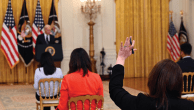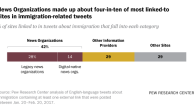Summary of Findings

The public took a renewed interest in the war in Afghanistan last week as President Obama unveiled plans to send more troops there while vowing to start bringing them home in 2011. Still, as many people say they talked with friends about Tiger Woods’ troubles as Afghanistan.
More than four-in-ten (43%) say they followed news about Obama’s decision to send more troops to Afghanistan very closely, an interest level comparable to mid-2002. Throughout 2009, the percentage following Afghanistan news very closely often stood in the mid-20s. Two-in-ten (20%) say this was the story they followed most closely last week, higher than any other week this year – but still below the 29% that say they followed the debate over health care legislation most closely.
According to the Pew Research Center’s latest weekly News Interest Index, conducted Dec. 4-7 among 1,003 adults, 10% say the evolving Tiger Woods scandal was the story they followed most closely. About two-in-ten (19%) say they followed the Woods story very closely; another 27% say they followed this news fairly closely.
But close to seven-in-ten (69%) say Woods’ crash and the allegations of infidelity that followed have received too much coverage. That is much more than the 44% that say the same about news about the Virginia couple that talked their way into a White House state dinner on Nov. 24 without an invitation.
A separate analysis by the Pew Research Center’s Project for Excellence in Journalism found that coverage of the war in Afghanistan was the top story of last week, accounting for 27% of the newshole, while the economy accounted for 14% of coverage. Woods’ troubles made up 6% of the newshole, while stories about Tareq and Michaele Salahis’ ability to get past White House security took up another 6%. With senators negotiating health care legislation largely behind closed doors, that story made up 5% of the newshole.

When people are asked which recent news story they have been talking about with friends, 30% mention Tiger Woods, 29% say Obama’s decision on Afghanistan strategy and 26% say health care reform. . Women are just as likely as men to mention Woods (31% vs. 29%). There were only slight differences among age, race or political groups, though those from households earning at least $75,000 a year are much more likely to say they have been talking about Woods (40%) than are those in households earning less than $30,000 a year (19%).
Other top stories engendered less conversation; 16% say they talked with friends about the economy, 7% talked about the Salahis’ attendance at the White House event and 5% say they talked about the case of the four police officers killed in Washington state.

When asked which of the top stories received too much coverage, no story other than Woods’ troubles and the Salahi exploits reaches double digits: 9% say the health care debate has received too much coverage, 7% say the same about Obama’s decision to send more troops to Afghanistan and 4% say there has been too much coverage of either the condition of the economy or the police officers killed in Washington.
Little Change in Favorable Opinions of Obama
Despite the extensive coverage of Obama’s decision on Afghanistan, close to six-in-ten Americans (57%) say their opinion of the president has not changed in the past few weeks. More than a quarter (27%) say their opinion has become less favorable, while 12% say their opinion has become more favorable. In mid-September, 53% said their opinion of Obama had not changed in recent weeks; 19% said it had become more favorable and 26% said it had become less favorable.
Close to half of Republicans (48%) say their opinion of Obama has become less favorable in recent weeks, compared with 7% of Democrats and 31% of independents. About seven-in-ten Democrats (68%) say their opinion has not changed, compared with 49% of Republicans and 57% of independents. Close to a quarter of Democrats (23%) say their opinion is now more favorable; just 2% of Republicans and 8% of independents say the same.
A narrow majority (52%) continues to expect health care legislation to pass, though Democrats are much more optimistic about its prospects than Republicans or independents. Just over a third (35%) of Americans say a measure will not pass in the next year. These numbers have changed little in recent weeks.
Nearly two-thirds of Democrats (64%) say they expect health care legislation to pass, compared with 44% of Republicans and 47% of independents. Republicans are just as likely to say a bill will not pass this year (44%), compared with 38% of independents and 23% of Democrats.
Most Continue to See Mix of Good and Bad Economic News

About six-in-ten (59%) Americans say they are hearing a mix of good and bad economic news, largely unchanged from the 62% that said the same in early November. One third (33%) say they are hearing mostly bad news and 7% say they are hearing mostly good news.
These numbers have shifted only slightly in recent months, though the most recent survey was in the field shortly after the U.S. Department of Labor announced on Dec. 4 that job losses for November were significantly fewer than expected – the smallest in 23 months – and that the unemployment rate had dropped slightly. A greater percentage of Republicans (41%) than Democrats (23%) say the economic news they have been hearing is mostly bad. About a third of independents (34%) say the same. Two-thirds of Democrats (66%) say they have been hearing a mix of good and bad news, compared with 52% of Republicans and 59% of independents.
Modest Awareness of Climate Stories

About one-in-five Americans (19%) have heard a lot about the international meeting to discuss climate change in Copenhagen that is now underway. About as many (17%) say they have heard a lot about the disclosure of private emails between prominent climate scientists regarding global warming data. Fewer have heard a lot about the White House job summit that took place a week ago (11%) or about Comcast’s plan to buy NBC Universal (11%).
There is virtually no difference in awareness of the Copenhagen climate-change meeting by party. About six-in-ten Republicans, Democrats and independents have heard at least a little about the gathering; that includes 20% of Republicans, 19% of Democrats and 18% of independents who have heard a lot about it.
Republicans, however, are more likely to have heard about the climate-related email controversy: 23% have heard a lot about this, compared with 11% of Democrats. Among independents, 17% have heard a lot.
Top Stories
After several months of deliberations, President Obama’s decision and speech about the strategy going forward in Afghanistan brought a significant increase in interest in that story. More than four-in-ten (43%) say they followed the story very closely, compared with 29% in the week just before Thanksgiving.
About a third of Americans (32%) say they watched Obama’s Dec. 1 speech on television, while slightly more (39%) say they just heard or saw reports about the speech. Only 3% say they watched it on the internet, while 2% say they heard it on radio. Another 14% say they did not watch or hear the speech or get news about the Afghanistan decision.
Though coverage of the health care debate was down last week to 5% of the newshole according to PEJ, 42% of the public say they c ontinued to follow developments on this story very closely; 29% say this was the story they followed most closely.
About two-in-ten (21%) say they followed the killings of four police officers in Washington state very closely, while 7% say this was the story they followed most closely. The story accounted for 4% of the newshole.
According to PEJ, the Tiger Woods story and the story about the couple who attended the White House state dinner without an invitation each took up about 6% of the newshole. About two-in-ten (19%) say they followed the Woods story very closely, while 16% say they followed the Salahi story very closely. But 10% say the Woods story was the story they followed most closely, compared with 4% who say the same of the Salahi story.

About the News Interest Index
The News Interest Index is a weekly survey conducted by the Pew Research Center for the People & the Press aimed at gauging the public’s interest in and reaction to major news events.
This project has been undertaken in conjunction with the Project for Excellence in Journalism’s News Coverage Index, an ongoing content analysis of the news. The News Coverage Index catalogues the news from top news organizations across five major sectors of the media: newspapers, network television, cable television, radio and the internet. Each week (from Monday through Sunday) PEJ compiles this data to identify the top stories for the week. The News Interest Index survey collects data from Friday through Monday to gauge public interest in the most covered stories of the week.
Results for the weekly surveys are based on landline telephone interviews among a nationwide sample of approximately 1,000 adults, 18 years of age or older, conducted under the direction of ORC (Opinion Research Corporation). For results based on the total sample, one can say with 95% confidence that the error attributable to sampling is plus or minus 4 percentage points.
In addition to sampling error, one should bear in mind that question wording and practical difficulties in conducting surveys can introduce error or bias into the findings of opinion polls, and that results based on subgroups will have larger margins of error.
For more information about the Project for Excellence in Journalism’s News Coverage Index, go to www.pewresearch.org/pewresearch-org/journalism.




